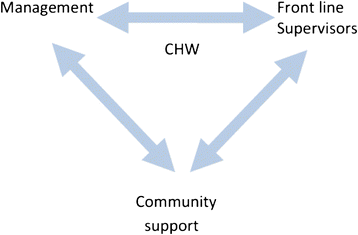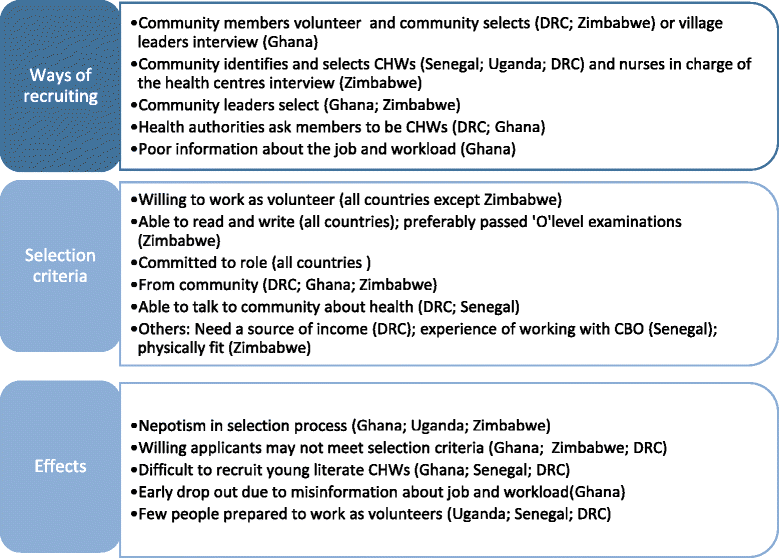Using a human resource management approach to support community health workers: experiences from five African countries
- PMID: 26324423
- PMCID: PMC4556018
- DOI: 10.1186/s12960-015-0034-2
Using a human resource management approach to support community health workers: experiences from five African countries
Abstract
Background: Like any other health worker, community health workers (CHWs) need to be supported to ensure that they are able to contribute effectively to health programmes. Management challenges, similar to those of managing any other health worker, relate to improving attraction, retention and performance.
Methods: Exploratory case studies of CHW programmes in the Democratic Republic of Congo, Ghana, Senegal, Uganda and Zimbabwe were conducted to provide an understanding of the practices for supporting and managing CHWs from a multi-actor perspective. Document reviews (n = 43), in-depth interviews with programme managers, supervisors and community members involved in managing CHWs (n = 31) and focus group discussions with CHWs (n = 13) were conducted across the five countries. Data were transcribed, translated and analysed using the framework approach.
Results: CHWs had many expectations of their role in healthcare, including serving the community, enhancing skills, receiving financial benefits and their role as a CHW fitting in with their other responsibilities. Many human resource management (HRM) practices are employed, but how well they are implemented, the degree to which they meet the expectations of the CHWs and their effects on human resource (HR) outcomes vary across contexts. Front-line supervisors, such as health centre nurses and senior CHWs, play a major role in the management of CHWs and are central to the implementation of HRM practices. On the other hand, community members and programme managers have little involvement with managing the CHWs.
Conclusions: This study highlighted that CHW expectations are not always met through HRM practices. This paper calls for a coordinated HRM approach to support CHWs, whereby HRM practices are designed to not only address expectations but also ensure that the CHW programme meets its goals. There is a need to work with all three groups of management actors (front-line supervisors, programme managers and community members) to ensure the use of an effective HRM approach. A larger multi-country study is needed to test an HRM approach that integrates context-appropriate strategies and coordinates relevant management actors. Ensuring that CHWs are adequately supported is vital if CHWs are to fulfil the critical role that they can play in improving the health of their communities.
Figures
References
-
- Unicef, UNDP, World Bank, WHO Special Programme for Research and Training in Tropical Disease. Community directed interventions for major health problems in Africa: a multi-country study: final report. Geneva: WHO; 2008
-
- Global Health Workforce Alliance . Integrating community health workers in national health workforce plans. Geneva: Global Health Workforce Alliance; 2010.
-
- Walker P, Downey S, Crigler L, LeBan K. CHW principles of practice: guiding principles for non-governmental organisations and their partners for coordinated national scale up of community health worker programmes. Washington DC: CORE Group, World Vision International; 2013.
Publication types
MeSH terms
LinkOut - more resources
Full Text Sources
Other Literature Sources
Miscellaneous




